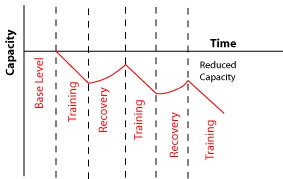The human body strives to maintain homeostasis; a fancy term for balance. To maintain homeostasis, the body continually adapts to its environment. Training is simply the manipulation of the application of stress and the body’s adaptation to the stress in order to maintain a state of homeostasis. Through that manipulation, the specific adaptive response we are attempting to achieve is called ‘Supercompensation.”
Supercompensation is a four-step process. The first step is the application of some training load or stress and the body’s reaction to this stress – fatigue. There will be a drop off in performance because of that fatigue. Step two is the recovery phase. This can be accomplished with an easier training session, an active recovery session or complete rest. Step three is the Supercompensation phase. The body adapts to the stress by rebounding above the baseline fitness level. Step four is the loss of the supercompensation effect.

If no additional training stress is applied during the supercompensation phase then supercompensation will decline. This is referred to as ‘De-Training.’ However, if additional training stress is applied at the peak of supercompensation, then improved capacity/capability will result.

Conversely, if additional training stress is applied before full recovery, then there is a continual decline and ultimately overtraining syndrome becomes a possibility.

That is a very brief, simplistic description of what we are trying to accomplish through training, or more accurately, through the application of training stress. If an athlete never trains hard, by which I mean harder than their baseline, they will never achieve supercompensation and will never improve. Alternatively, if an athlete ONLY trains hard and never allows proper recovery, they may apply the next dose of training stress inappropriately and possibly reduce their capacity or worse.
Training then can be defined as – the manipulation of training stress and recovery to achieve supercompensation.
Supercompensation and the physiological responses to training stress are the ‘science’ of training while the successful manipulation of training stress and recovery can be called the ‘art’ of training (I like to call it the art of coaching).
